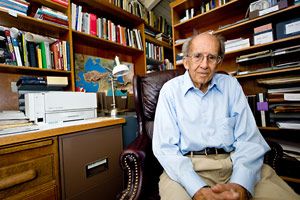

In Soviet-occupied Dubienka, Poland, located by the Bug River and on the border with Ukraine, Sam Szor remembers the military fortification by German armed forces in anticipation of the upcoming invasion of the Soviet Union. He describes the invasion, which took place in the dawn of the morning hours of June 22, 1941. It was his birthday. He recalls the retreat of the Soviet armed forces and the resulting fear felt by the Jewish population with the German occupation of Dubienka.
Testimonies of survivors and witnesses of the 1994 Rwandan Tutsi Genocide added to USC Shoah Foundation’s Visual History Archive have resulted in 500 new search terms for the archive’s indexing system.
The index is a controlled vocabulary of more than 50,000 terms that make up the Shoah Foundation’s Thesaurus and that allow detailed searching of the testimonies in the archive.
You’re invited to the USC Shoah Foundation!
Free and open to the public, our monthly tours give visitors a chance to explore the life stories of survivors and witnesses of the Holocaust and other genocides and to discover how their memories are being used to overcome prejudice, intolerance, and bigotry.
June 18 saw the U.S. premiere of a set of piano variations on a Polish patriotic theme composed in the Dachau concentration camp by prisoner of war Leon Kaczmarek (1903–1973). Kaczmarek’s composition was performed by 17-year-old pianist Nicholas Biniaz-Harris, winner of the National Symphony Orchestra’s 2013 Young Soloists’ Competition.
Representatives from more than 30 Holocaust museums and centers in the United States and Canada came to Los Angeles this week for the 2013 Association of Holocaust Organizations (AHO) Winter Seminar, hosted for the first time by USC Shoah Foundation – The Institute for Visual History and Education.
On June 6, Steven Spielberg, Founder of the USC Shoah Foundation Institute, presented Robert A. Iger, Chairman and CEO of The Walt Disney Company, with the Institute’s highest honor, the Ambassador for Humanity Award. Iger was honored at the Institute’s annual gala, where he was recognized for his support of the Institute’s work, his longtime philanthropy, and his leadership role in corporate citizenship. The gala presenting sponsor was jcpenny. Jimmy Kimmel hosted, and Mary J. Blige gave a special musical performance.
Celina Biniaz, a “Schindler Jew,” remembers hearing about the end of the war while listening to an underground radio at the munitions factory set up by Oskar Schindler in the Brünnlitz concentration camp in Czechoslovakia. The Brünnlitz concentration camp was liberated by the Soviet armed forces in May 1945. With the approach of the Soviets, Oskar Schindler left and arranged for several of the camp personnel to leave as well. Celina Biniaz remembers her liberation and describes her liberators.